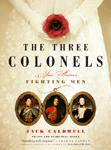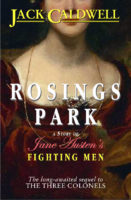Greetings, everybody! Jack Caldwell here.
 As anyone who has read the ground-breaking THE THREE COLONELS (a sequel to both Pride and Prejudice and Sense and Sensibility), they know I love to write about Jane Austen’s minor characters, imbuing them with more human feelings, talents, and fallacies. I see them in shades of gray. After all, there are no true villains in Pride and Prejudice; the characters that cause trouble for Darcy and Elizabeth are simply selfish, stupid, silly, greedy, or desperate. They are not evil. In fact, most of our dear couple’s problems are caused by their own foolish preconceived thoughts, ideas, and actions.
As anyone who has read the ground-breaking THE THREE COLONELS (a sequel to both Pride and Prejudice and Sense and Sensibility), they know I love to write about Jane Austen’s minor characters, imbuing them with more human feelings, talents, and fallacies. I see them in shades of gray. After all, there are no true villains in Pride and Prejudice; the characters that cause trouble for Darcy and Elizabeth are simply selfish, stupid, silly, greedy, or desperate. They are not evil. In fact, most of our dear couple’s problems are caused by their own foolish preconceived thoughts, ideas, and actions.
It is why I tend to humanize, and sometimes reform, figures like Caroline Bingley, William Collins, Lady Catherine de Bourgh, and (to a certain extent) George Wickham.
(The real villain in THE THREE COLONELS is Napoleon Bonaparte, but I digress…)
 I continue this propensity in the novel’s sequel, ROSINGS PARK. The following short scene takes place in the middle of the book. The Darcys and the Bufords are attending a summer party at Rosings Park, now under the management of Lady Anne de Bourgh Fitzwilliam and her husband, Sir Richard Fitzwilliam. (The retired colonel has been knighted.) Lady Catherine resides in the dowager house. There is a mystery about and, of course, Mr. Darcy must make himself useful…
I continue this propensity in the novel’s sequel, ROSINGS PARK. The following short scene takes place in the middle of the book. The Darcys and the Bufords are attending a summer party at Rosings Park, now under the management of Lady Anne de Bourgh Fitzwilliam and her husband, Sir Richard Fitzwilliam. (The retired colonel has been knighted.) Lady Catherine resides in the dowager house. There is a mystery about and, of course, Mr. Darcy must make himself useful…
June 1817 – Rosings Park, Kent
DARCY WALKED TOWARDS the Rosings Home Farm vegetable gardens in the bright, late morning sun with a very unusual companion. “Forgive me, sir, but are you certain you can say why the gardens are failing?”
Mr. Collins bowed from his shoulders. “Mr. Darcy, I thank you for your generous condescension. While it is my solemn duty to care for the spiritual needs of my flock, what passion I can spare from my dearest Charlotte and sweet children I spend in my garden. It is my most perfect joy to study the words of Our Lord, but I do take some little time to devour any book or pamphlet on horticulture I can procure. It is not proper, I know, to boast of one’s abilities, but I believe I can humbly say that my gardens are some of the finest in the district.”
Somehow, Darcy refrained from rolling his eyes at the silly man’s pompous chattering. He would have not called on Mr. Collins’s help, except that no one at Rosings could explain why the vegetable gardens were failing. Money that should have been used to make repairs and support the needy had to be used to purchase food for the manor’s table.
Richard left the enquiry to the new steward, Mr. Evans, but Darcy was unimpressed with that man’s efforts. Evans owned some talent, he allowed, but the steward spent much of his time disparaging the tenants’ work and flattering Lady Catherine’s vanity. It appeared that the man had taken Mr. Collins’s place in humoring his aunt’s sizeable conceit. Evans simply ordered the gardeners to redouble their efforts and was disinclined to investigate why the crops were dying.
In Darcy’s mind, this was foolish and irresponsible. True to his exacting character, the master of Pemberley took it upon himself to learn why Rosings had suffered such a calamity. It had been his obligation in the five years following his father’s death to assist Lady Catherine and oversee Rosings’ steward, and though he had lost that duty in the wake of his marriage to Elizabeth four and a half years before, it was hard to break the habit.
All of Darcy’s inquiries had come to naught. Stumped, he reluctantly agreed to Mrs. Collins’s suggestion that her husband might prove useful. It was why he now found himself walking with the heavy-set cleric, followed by a livery-clad footman holding a folded blanket.
“And you can tell us what is wrong with the gardens?” Darcy repeated.
“I can promise nothing, my dear sir,” Collins said with a smile, “but I shall use all my knowledge and faculties in the service of my generous patroness.” The man was clearly pleased with himself.
Darcy was struck by a certain word. “Faculties, Mr. Collins?”
The tall, stout vicar simply nodded, his attention focused on the gardens. It was in shambles: few plants had grown, and of those, most were brown and wilted. The rest of the patch was a mixture of dead plants and bare soil.
“A disgrace, sir,” Mr. Collins said, an uncommon frown marking his forehead. “An absolute disgrace.”
Darcy abstained pointing out that the rector was stating the obvious. “Extra manure has been introduced to little success. The gardener is at a loss on what to do next.”
“I am not surprised,” Mr. Collins mumbled to himself. He then caught himself and continued in a louder voice, engaging in voracious commendation of the Rosings staff for their loyalty and diligence. Darcy was sorry to hear it; he liked and respected succinctly blunt honesty, and had no use for flowery, long-winded false praise.
“I am certain that the field hands will welcome your approbation, Mr. Collins. To the matter before us—have you anything to offer that might reverse this state of affairs?”
“It cannot the weather,” Mr. Collins stated with some authority. “It is unnaturally cool, to be sure, but not impossible to grow vegetables, as proved by the bounty in my own garden. If you will permit me…” He turned to the footman and retrieved the blanket he insisted the man carry. Collins then placed the cloth on the ground, knelt on it, and handed his squat, wide-brimmed hat to the servant. To Darcy’s utter astonishment, the man bent over until his nose was an inch above the soil. He then began to sniff the ground, much like the fox hounds during the hunt.
If Darcy thought this behavior was bizarre, what happened next caused him to doubt the cleric’s sanity. Mr. Collins had pinched a bit of soil and placed it in his mouth!
“Mr. Collins! What—?”
Mr. Collins returned to a kneeling position, a look of satisfaction on his face. “It is as I feared. Mr. Darcy, these gardens must be abandoned. The soil has been salted.”
It took a moment for Collins’s words to register. “Salted? Are you certain?”
“Oh, yes, there is no doubt about it. Would you care for a taste?”
The fool was serious! “I thank you, no.”
Mr. Collins surveyed the expanse before him, his hands on his knees. “It is no wonder the Rosings gardener was defeated. A cursory examination would be unprofitable in determining the cause. There is no smell or visible evidence, you see, save the dead plants. Only a small amount of salt is required to produce these results; therefore, the gardeners would not see it, particularly after a rain. I suspected such a thing, and the lack of odor made me confident in my speculation. However, tasting the soil is the only method to prove my hypothesis.”
The large, heavy man struggled to rise, and Darcy grasped his upper arm to help him to his feet. “Thank you, my dear sir! That my cousin’s noble husband, a man of stature and importance in the world, should show such consideration to my undeserving self is condescension indeed! Pray, use my handkerchief to cleanse your hand!”
“Thank you, no, Mr. Collins,” said an embarrassed Darcy as he stepped back and withdrew a square from his pocket. “I always use my own.”
“Of course, of course!” Mr. Collins replaced his hat on his head while he contemplated the gardens. “Yes, this plot must be abandoned. The salt has ruined the soil, and no amount of manure can save it. New gardens must be prepared at no little distance from here, lest the salt leeches into the good soil.”
The good man frowned. “Whoever did this should be severely punished.” He turned to Darcy in a fury. “This cannot be an accident, Mr. Darcy. This was deliberate! This was… malicious! To destroy, perhaps forever, a part of the Lord’s world… this lovely garden…” He shut his lips into a tight, white line as he struggled with his anger. “Who could have committed such an evil deed?”
“I have no idea.” Darcy thought Collins’s surprising behavior interesting and revealing. The cleric showed more true, honest emotion over a small plot of land that he ever displayed for his family, his position, or his congregation.
Mr. Collins is ill-placed in his profession, Darcy concluded. He should have been a farmer. Perhaps Longbourn shall one day have a master worthy of it. For all of Mr. Bennet’s other admirable qualities, Mr. Collins may prove to be a better steward of the land than my inattentive father-in-law.
“We must advise Lady Fitzwilliam at once!” Mr. Collins declared. Before Darcy could respond, the tall, heavy man spun about and ran into the footman, knocking the servant to the ground. “Clumsy fool! You should take better care where you stand!” the vicar cried as he quickly continued on his way.
Without a word, Darcy assisted the hapless footman to his feet, thinking that the next master of Longbourn may not be worthy of the estate, after all.
What do you think of Detective Collins and his assistant, Mr. Darcy? How will Richard Fitzwilliam react to Darcy’s unauthorized insertion into Rosings Park’s’ business? And who is salting the gardens of Rosings Park?
ROSINGS PARK will be awhile before it comes out. I’ve written almost half of it.
Until next time, this has been the Cajun Cheesehead Chronicles.

It takes a real man to write historical romance, so let me tell you a story…

19 comments
Skip to comment form
This was great, and the only thing left to say is write faster! I do love all your books, so waiting is very painful.
Author
I’m writing right now! But the muse has her own speed…
Very interesting, Jack! Very last line – did you mean to say what you did? You’ve proven Collins to be a capable farmer; therefore I believe you should say that he MAY BE WORTHY. He’s a bumbler in any other way…
Author
Collins might be good farming the land, but as for dealing with people… Not so good. Darcy is all about treating his people with respect. Thanks for reading!
So why didn’t Richard investigate, look forward to reading the book
Author
A subplot of the novel is Richard’s transition from soldier to civilian. Richard is, in his mind, still a soldier. He gave his underling, Mr. Evans, an order and expects it to be carried out. He trusts his “men” to know their job. Plus, Richard wishes to prove himself as a landowner to Darcy.
Another item. Richard is NOT a landowner. His wife, Anne, owns Rosings Park. She has placed him in charge of the farms and tenants. He never forgets this point. So, he is trying to prove himself to her.
Lastly, Richard is not the kind of person to ask for help…
Great excerpt! Love books in which Richard ends up with Anne and Darcy and he have potential “territorial” conflicts. Just noticed a couple of things in the excerpt, however.
“food for the manner’s table” — manor’s
“facilities” — unless this is Regency vocabulary should probably be faculties
Happy writing; really looking forward to this sequel to Three Colonels which I really liked.
Author
Darcy is Darcy, and he MUST be useful. Translation — he sticks his nose where it does not belong. It does not matter that he is right…
A delightful excerpt! A mystery…who has salted the kitchen gardens?? Darcy’s on the case…. 😉
As always, I look forward to one of your new books, Mr. Caldwell. Hoping your Muse decides to “giddy-up” rather than poke along. 😉
Thank you for sharing this piece with us!
Warmly,
Susanne 🙂
Author
Yep, Darcy’s on the case. But, is that a good thing? Hmm…
Great excerpt. Collins is a bumbling idiot, but at least he solved part of the garden problem. Now he needs to figure out where all the salt came from and who destroyed the garden.
Author
Collins must be Collins, but at least he’s on the side of the good guys.
Now this is an interesting twist…who wants Richard to fail? Mrs. Collins has certainly continued with her encouragement to have Mr. Collins work in his garden! Looking forward to this!
Author
The fun part of writing is to get one’s readers guessing!
Humanise me, sir? Why, was there ever a man more humble than I – I think not!
Author
Egad! You speak well for a dead man (in this universe).
One is never down for long!
I like this. You have taken directly grom Jane Austen, Mr Collins and his love of his garden, and showed it as a strength in a character that is usually depicted to be a clown. Well done!
This does sound very interesting. I do like a good mystery story and even with this short excerpt I am wondering not only who the culprit could be but also their motive. The persons who would receive the charity now directed to purchasing food are the ones hurting, not the Rosings estate. Thank you for sharing and further good luck with your writing.